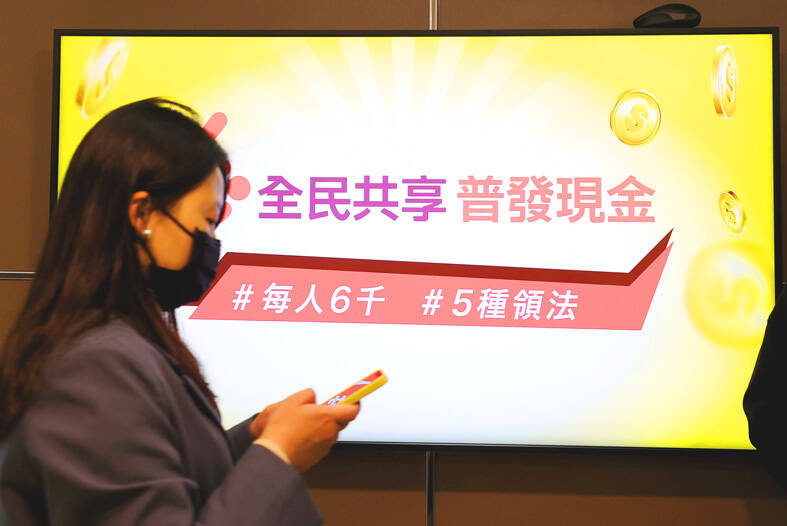The nation’s eight state-run banks and several private banks yesterday deposited NT$6,000 (US$197) into the bank accounts of people who had registered online to claim the government cash payments, well ahead of the original schedule.
The change was made following an interministerial meeting convened by the Ministry of Finance late on Friday, after O-Bank Co Ltd (王道商業銀行) earlier in the day deposited NT$6,000 in the accounts of its clients who had registered, ahead of the government’s plan to release the funds on Thursday.
O-Bank Co apologized, saying that it wanted to give its clients the payment before the long weekend, which started yesterday.

Photo: CNA
Vice Premier Cheng Wen-tsan (鄭文燦) yesterday said that O-Bank released about NT$49 million, as just more than 8,000 of its clients had registered to claim the payment.
Using some of last year’s tax surplus, the government is giving NT$6,000 to citizens, foreign nationals with permanent residency and resident spouses of Taiwanese.
People who do not wish to register online to have the money deposited into their bank accounts can get the money from select ATMs by using their bank card and entering their ID and National Health Insurance card number. They can also collect by taking their ID and National Health Insurance card to a post office from April 17.
The interministerial meeting concluded that banks could disburse the payment “as soon as possible,” an official said yesterday.
Whether people receive their deposit before the end of the long weekend would depend on the number of people who have registered their bank details and whether their bank is willing to distribute the payment earlier than planned, the official said.
As of yesterday, the nation’s eight state-run banks had begun depositing the payments, as well as several private banks, including CTBC Bank (中國信託銀行), Taishin International Bank (台新銀行), Sun Commercial Bank (玉山銀行), Union Bank of Taiwan (聯邦銀行), KGI Bank (凱基銀行) and Line Bank Taiwan Ltd (連線商業銀行).
Chunghwa Post would deposit the payments starting today.
People can update their bank passbook or access their account information online to check if they have received the payment, the Ministry of Finance and the Ministry of Digital Affairs said.
The description in bank passbooks would read “from the Executive Yuan (行政院發),” online references should read “from the Executive Yuan” or “cash payment shared by all (全民共享發現金 or 全民共享普發現金).”
If people who registered online have not received the payment, they can check their registration status at 6000.gov.tw. If they have entered incorrect information, they can register again.
If people register on the Web site after Thursday next week, they can expect to receive the deposit within two working days.
The finance ministry said some local media have incorrectly reported that the deadline for online registration was on Friday.
Online registration is available 24 hours a day until Oct. 31, it said.
Additional reporting by Hsu Tzu-ling

MAKING WAVES: China’s maritime militia could become a nontraditional threat in war, clogging up shipping lanes to prevent US or Japanese intervention, a report said About 1,900 Chinese ships flying flags of convenience and fishing vessels that participated in China’s military exercises around Taiwan last month and in January last year have been listed for monitoring, Coast Guard Administration (CGA) Deputy Director-General Hsieh Ching-chin (謝慶欽) said yesterday. Following amendments to the Commercial Port Act (商港法) and the Law of Ships (船舶法) last month, the CGA can designate possible berthing areas or deny ports of call for vessels suspected of loitering around areas where undersea cables can be accessed, Oceans Affairs Council Minister Kuan Bi-ling (管碧玲) said. The list of suspected ships, originally 300, had risen to about

DAREDEVIL: Honnold said it had always been a dream of his to climb Taipei 101, while a Netflix producer said the skyscraper was ‘a real icon of this country’ US climber Alex Honnold yesterday took on Taiwan’s tallest building, becoming the first person to scale Taipei 101 without a rope, harness or safety net. Hundreds of spectators gathered at the base of the 101-story skyscraper to watch Honnold, 40, embark on his daredevil feat, which was also broadcast live on Netflix. Dressed in a red T-shirt and yellow custom-made climbing shoes, Honnold swiftly moved up the southeast face of the glass and steel building. At one point, he stepped onto a platform midway up to wave down at fans and onlookers who were taking photos. People watching from inside

Japan’s strategic alliance with the US would collapse if Tokyo were to turn away from a conflict in Taiwan, Japanese Prime Minister Sanae Takaichi said yesterday, but distanced herself from previous comments that suggested a possible military response in such an event. Takaichi expressed her latest views on a nationally broadcast TV program late on Monday, where an opposition party leader criticized her for igniting tensions with China with the earlier remarks. Ties between Japan and China have sunk to the worst level in years after Takaichi said in November that a hypothetical Chinese attack on Taiwan could bring about a Japanese

The WHO ignored early COVID-19 warnings from Taiwan, US Deputy Secretary of Health and Human Services Jim O’Neill said on Friday, as part of justification for Washington withdrawing from the global health body. US Secretary of State Marco Rubio on Thursday said that the US was pulling out of the UN agency, as it failed to fulfill its responsibilities during the COVID-19 pandemic. The WHO “ignored early COVID warnings from Taiwan in 2019 by pretending Taiwan did not exist, O’Neill wrote on X on Friday, Taiwan time. “It ignored rigorous science and promoted lockdowns.” The US will “continue international coordination on infectious